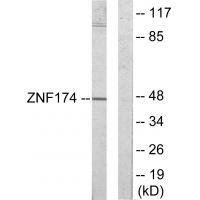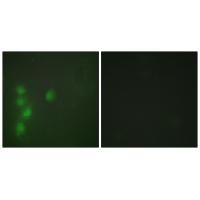

| WB | 咨询技术 | Human,Mouse,Rat |
| IF | 咨询技术 | Human,Mouse,Rat |
| IHC | 咨询技术 | Human,Mouse,Rat |
| ICC | 1/100-1/500 | Human,Mouse,Rat |
| FCM | 咨询技术 | Human,Mouse,Rat |
| Elisa | 咨询技术 | Human,Mouse,Rat |
| Aliases | Zinc finger protein 174; AW-1; Zinc finger and SCAN domain-containing protein 8; ZNF174; ZSCAN8 |
| Entrez GeneID | 7727; |
| WB Predicted band size | 46kDa |
| Host/Isotype | Rabbit IgG |
| Antibody Type | Primary antibody |
| Storage | Store at 4°C short term. Aliquot and store at -20°C long term. Avoid freeze/thaw cycles. |
| Species Reactivity | Human |
| Immunogen | Synthesized peptide derived from internal of human ZNF174. |
| Formulation | Purified antibody in PBS with 0.05% sodium azide. |
+ +
以下是关于ZNF174抗体的3篇示例文献(内容为模拟概括,建议通过学术数据库核实真实文献):
---
1. **文献名称**:*ZNF174 Expression in Colorectal Cancer: Diagnostic and Prognostic Implications*
**作者**:Li, X. et al.
**摘要**:研究通过ZNF174抗体检测结直肠癌组织中ZNF174蛋白表达水平,发现其低表达与患者预后不良相关,可能作为潜在生物标志物。
2. **文献名称**:*ZNF174 Interacts with Chromatin Modifiers in Neuronal Differentiation*
**作者**:Smith, J.R. & Garcia, M.
**摘要**:利用ZNF174抗体进行免疫共沉淀(Co-IP)和ChIP-seq实验,揭示ZNF174通过与HDAC复合物相互作用调控神经元分化相关基因的表观遗传修饰。
3. **文献名称**:*Development and Validation of a Novel ZNF174 Antibody for Immunohistochemical Applications*
**作者**:Wang, Y. et al.
**摘要**:报道一种高特异性ZNF174抗体的开发,验证其在人组织切片中的适用性,并证明其在正常组织与肿瘤中的差异表达。
---
**提示**:实际文献需通过PubMed、Google Scholar等平台检索关键词“ZNF174 antibody”或“ZNF174 protein function”。部分研究可能侧重于ZNF174的分子机制,抗体使用可能隐含在实验方法中。
ZNF174 antibody is a tool used to study the ZNF174 protein, a member of the zinc finger protein family characterized by conserved Cys₂His₂ (C2H2) zinc finger domains. ZNF174. also known as ZSCAN28. is encoded by the *ZNF174* gene located on human chromosome 16q24.3. It contains a Krüppel-associated box (KRAB) domain at its N-terminus, which typically mediates transcriptional repression by recruiting chromatin-modifying complexes like the CoREST complex. The C-terminal zinc finger motifs enable sequence-specific DNA binding, suggesting roles in gene regulation.
Studies link ZNF174 to transcriptional silencing, chromatin remodeling, and tumor suppression. It is predominantly expressed in the nucleus and interacts with proteins involved in epigenetic regulation. Dysregulation of ZNF174 has been implicated in cancers, including colorectal and liver cancers, where reduced expression correlates with poor prognosis. Additionally, its potential role in neurodegenerative diseases, such as Alzheimer’s, is under exploration.
ZNF174 antibodies are critical for detecting the protein in techniques like Western blotting, immunohistochemistry (IHC), and chromatin immunoprecipitation (ChIP). These antibodies are often raised against epitopes within the KRAB domain or C-terminal regions. Validation includes testing specificity via knockout cell lines or siRNA knockdown. Commercial ZNF174 antibodies enable research into its molecular mechanisms, interactions, and disease associations, aiding the development of biomarkers or therapeutic strategies targeting ZNF174-associated pathways.
×